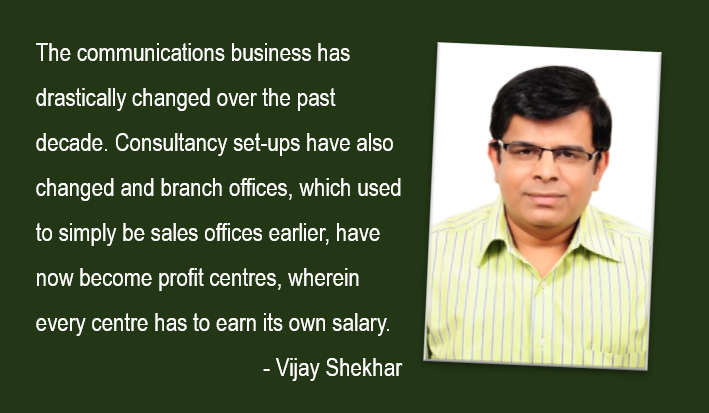Customers facing ‘network issues’ with telecom companies is a known and everyday fact. It’s something that’s synonymous with even the biggest and best brands in the space. But there’s one more sector in our country that has been quietly grappling with this problem called ‘network issues’ for years now… the consultancy side of the PR business. And there seems to be no solution or breakthrough. Options range from dealing with it with set policies or handling it artistically. The latter is what consultancy personnel have been trying to do over the years, but without much success.
Then and Now
Gone are the days when communications consultancies worked on a ‘factory & sales’ model, wherein the Head Office branch would generate a product (read ‘clients’) and the regional centres would be the sales offices selling (read ‘servicing’) the product. The clients would generally be out of the ‘strategic’ centres of Delhi, Mumbai and more recently Bengaluru. These were the cities where most of the consultancies were and still are headquartered. And these used to be the cities which earned the monies for various consultancies through client acquisitions. Other centres like Chennai, Kolkata, Hyderabad, Pune and Ahmedabad would have 1 – 3 employees each depending on the requirement, and these employees would look after the requirements for the those Head Office clients in their respective cities.
The salaries and branch expenses of each office used to be taken care of by the Head Office. There was no pressure on New Business Development (NBD) for these centres. It worked on the ‘hub & spokes’ model, wherein the strategy and planning happened from the client’s home city and only the implementation happened at the branch offices.
The communications business has drastically changed over the past decade. The way clients, media and other stakeholders look at PR has changed. Acquisitions have brought in fresh thought processes and practices. Consultancy set-ups have also changed. The branch offices, which used to simply be ‘sales’ offices, have now become profit centres, wherein every centre has to earn its own salary.
Why network issues happen?
Today it is imperative for every branch office to have its own client base and service them locally, regionally or nationally, as the need may be. Client retention and NBD, which used to be only the Head Office’s responsibility, have now become important branch responsibilities. And this responsibility lies in the hands of the respective branch heads, and somewhere percolates down to all the levels in a branch.
Whenever a consultancy pitches for a new business, one of the key slides is about the firms presence in the country. And every presenter proudly talks about having strong offices with strong media relations teams in Delhi, Mumbai, Kolkata, Chennai, Bengaluru, Pune, Ahmedabad and Hyderabad. Businesses that are new to PR and / or the concept of an outsourced PR firm, are outrightly impressed with this ‘8 key cities’ network. And technically, the consultancies are not wrong or making false claims…the offices are very much there and even the teams do exist.
And once the client is bagged from a particular centre, begins an avalanche of complaints like ‘Delhi is not supporting us’, ‘Bombay sent across a newly joined trainee to meet up with my client MD’, ‘We are not getting any coverage from the South centres’ and so on and so forth.
Somewhere down the line, even the clients who are regularly working through PR consultancies have started to realise that support really comes only from the core teams who are based in their home turf.
Resolving Network Issues
There are many ways to do it.
Time & Resource Allocation: Each branch head should set aside stipulated time and resources towards network clients. In a normal working day, 60 – 70% of the time and / or resources could be spent on home centre clients, and the remaining 30 – 40% on outstation clients. This could vary depending on the kind of support required on network clients.
PR within the PR Firm: This is an informal way of getting things done out of a network office, without going through the proper teams and team leads route. It is about identifying those one or two resources in the network offices who are good with their work and at the same time are good human beings, who understand the larger cause. They will help not because they are bound to, but because they believe in the importance of a client in a consultancy set-up. And this arrangement is more on a give-and-take level, wherein the help is returned with some good work on these resources’ home clients.
Revenue Sharing: This can happen only if the company’s policies permit and / or if the management has taken a decision to implement it. It cannot be done randomly on an ‘add salt to taste’ basis. Revenue sharing envisages a part of the client retainer being distributed among the active network offices based on the amount of work. Let’s take a hypothetical example of how this works…
There’s a client based out of Delhi, on a monthly retainership of INR 2,00,000/- and has fair amount of PR work happening from the network offices of Mumbai (it’s generally a key market for any client), Bengaluru, Chennai and Kolkata. So under revenue sharing, Rs. 1,00,000/- is retained by Delhi (since the client has been bagged by the Delhi office, they deserve a premium), and Rs. 25,000/- each is distributed to Mumbai, Bengaluru, Chennai and Kolkata every month.
This results in the revenue coming to a profit centre becoming the stimulus for the respective branch head and her / his team to give their 100% for an outstation client.
In a Nutshell…
The first and the most basic step towards resolving network issues is to understand that every client is first a ‘Consultancy Client’ and then a Delhi or a Mumbai or a Kolkata or a Bengaluru client. Once this thought process sets in, the resolution becomes easier.
The views expressed here are those of the author and do not necessarily reflect those of Reputation Today.



Be the first to comment on "Coping with team and network issues"